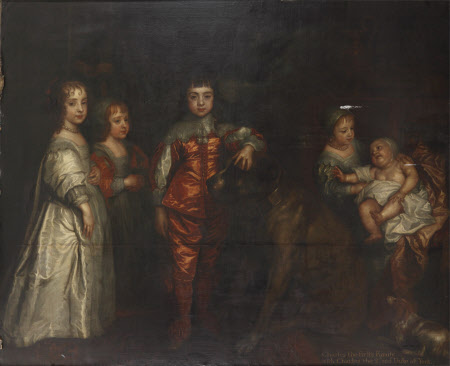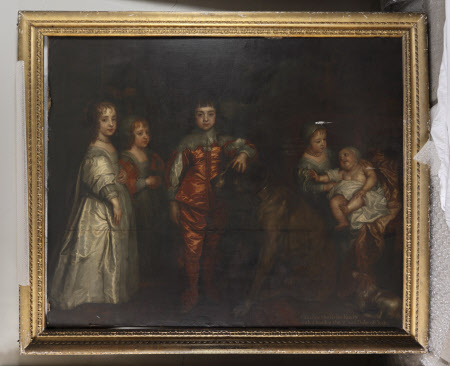The Five Eldest Children of King Charles I
after Sir Anthony Van Dyck (Antwerp 1599 - London 1641)
Category
Art / Oil paintings
Date
1700 - 1799
Materials
Oil on canvas
Measurements
1630 x 2000 mm
Place of origin
England
Order this imageCollection
Hardwick Hall, Derbyshire
NT 1129284
Caption
This is a copy of the original in the Royal Collection, signed and dated 1637. It is a charming and very popular image of the royal children. There are many copies of this composition and of the earlier, smaller one with only three children, which can be found throughout many country house collections. Its appeal extended beyond supporters of the Stuarts.
Summary
Oil painting on canvas, The Five Eldest Children of King Charles I, after Sir Anthony Van Dyck (Antwerp 1599 - London 1641). Full-length portraits, all standing, Left to right, Princess Mary Henrietta (1631-1660) turned to right, head facing, Prince James (James II) (1633-1701) in dress and cap, turned three-quarters to right, Prince Charles (Charles II) (1630-1685) facing, his right foot slightly forward, his right hand to his side his left on the head of a Lyme mastiff who is sitting on his haunches and turned to left, Princess Elizabeth (1635-1650) who supports with both her hand, Princess Henrietta Anne (Duchess of Orléans) (1644-1670) who is seated on a draped and tasselled chair and stretches her right hand towards her brother Charles; a small King Charles spaniel is seated on the ground looking up at Princess Elizabeth. Architectural background to left with drape, centre is a landscape view with trees and the right is occupied by a high table with and urn, vine-leaves in a dish and a fruit.
Provenance
In Swift 1811 inventory; thence by descent until, following the death of Edward William Spencer Cavendish, 10th Duke of Devonshire (1895 - 1950), Hardwick Hall and its contents were accepted by HM Treasury in part payment of death duties and transferred to the National Trust, in 1959
Credit line
Hardwick Hall, The Devonshire Collection (National Trust)
Makers and roles
after Sir Anthony Van Dyck (Antwerp 1599 - London 1641), artist

